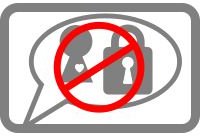What you need to know about Privacy and the Internet
Basics of Online Privacy - Identity Theft Scams
One of the worst dangers of exposing information online is identity theft. Identity theft is a very nasty type of attack, in which con artists gather your data and then use the information to steal your identity. Despite identity theft being a fairly non-intrusive action, you will need to be on watch for it: make sure that you don’t leave any sensitive information exposed online.
While some basic steps are obvious, like not revealing your social security number or credit card details to strangers online, you will also need to be careful to prevent exposing yourself to smart scammers. Social engineering is a growing field. Identity thieves can gather information from Facebook profiles and similar sites, and then use this information while impersonating a utility company, bank or friend. Keep your entire information safe by restricting who can see what, and don’t publish sensitive information at all.
Internet Privacy - General Privacy
Digital technology and social media are connecting the world more than ever, which can be a serious problem if you would like to maintain your privacy. Facebook and other social networking sites like it make your information available to a large number of people. There are three main types of privacy items that you’ll need to protect.
The first step is your personal privacy. This boils down to the fact that you probably don’t want your parents/co-workers/employers to find all those pictures of your drunken escapades. Don’t actually add them to your Facebook, or have a separate Facebook for family affairs. You would be shocked at how many people make this mistake. Secondly, keep your privacy settings updated. Facebook often changes privacy settings, so you will need to keep an eye on that, too.
Thirdly, you’ll also want to protect your privacy against some of the new marketing techniques coined personalization, explained in the link above including its privacy issues. Without going into much detail of the new social marketing and media, be aware that this is basically just a way to legally sell your information to marketers so that they can better target their ads to you and trick you into buying things that you don’t want. This is a growing trend that doesn’t just cover social marketing. A number of people are concerned about the information that Google Analytics gathers about you when browsing any type of web site. If you’d like to learn more about this, or learn how to turn off Google Analytics, you can read the linked article.
If you exercise some common sense, and also take a few steps to protect your privacy, then you should be fine for general privacy.
Online Privacy - Security
Besides avoiding annoying marketing and embarrassing situations, you also need to protect yourself from criminals. Cybercrime is a serious problem, and if you want to stay safe from it you will have to be alert online. I’ve already covered identify theft, but note some of the other real ways that you can run into trouble.
People often think nothing of revealing vacation plans, personal schedules etc, and effectively shout their private information from rooftops. It is quite easy for less than honest people to stumble across your information and pull off “Internet-powered” crimes. There are fairly conventional ones, such as burglaries based on knowing public information. The bigger threats might be frank scams.
We have a full article on Facebook scams, which are a much bigger problem than you might imagine. A new scam scheme has been targeting the parents and grandparents of college students, with scammers apparently getting public information about students and then calling and impersonating police officers who desperately need money wired to pay bail for the student “or else they’ll spend a weekend in jail.”
That’s just one. By leaving your information in public, it’s possible for people to pull off creative accounts or commit normal crimes with relatively little effort. This is even true for public figures. Sarah Palin’s e-mail was hacked because she used general secret questions, and then posted the answers all over the Internet through a series of interviews, never realizing the secret hole.
What you need to know about privacy and the Internet can never be enough. New scams and more con artists emerge as social media and the Internet evolves. It is recommend to regularly visit our site to find the latest news and useful information on security & privacy.
References and Further Reading
All information based on author’s personal experience online and with social networking.
If you’d like to learn more about phishing, you can start with our article on how to spot phishing scams.
Image Credit: Wikipedia Commons/Ikaxer
